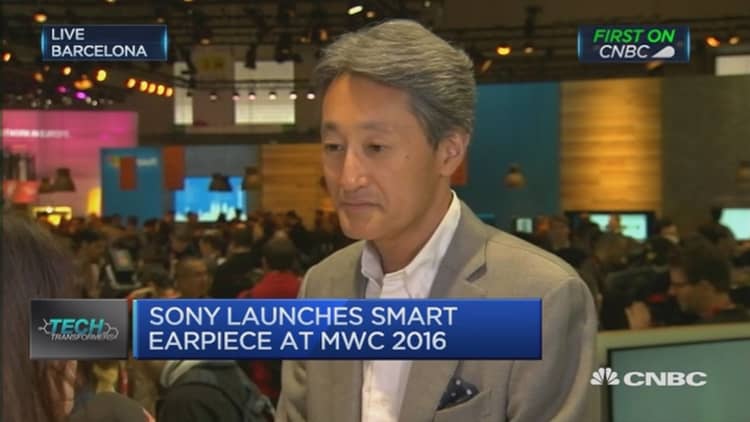
Sony has unveiled a host of interactive "smart" products including a wearable camera, a personal assistant to rival Amazon's Echo, and an adaptive projector as it seeks revenues from different types of devices as the smartphone market slows.
On top of the gadgets, the Japanese electronics giant also unveiled a new range of smartphones at its press conference at Mobile World Congress in Barcelona on Monday.
Sony took the wraps off three concept products which do not yet have an official launch date and are not yet made:
- Xperia Eye - a wearable camera with a lens that lets you capture an image in 360 degrees. It has an intelligent shutter that recognizes faces and movements.
- Xperia Projector - a portable short-throw projector that turns anything into an interactive surface. A user can place the device next to a table for instance, and can play around and interact with the projection that is shown.
- XPeria Agent - a personal assistant that users can talk to in order to carry out tasks such as playing music or turning on the TV.
Sony also launched the Xperia Ear, a small single earbud that people can wear and can get updates, such as the weather or an alert, from your smartphone. Users can talk to the device and it can carry out tasks like replying to a message or giving you directions. The Xperia Ear is set to launch in the summer but has no price yet.
The unveiling of these devices comes as Sony . It recently cut its full-year smartphone sales forecast for the fiscal year 2015 but in the three months ending December 31, operating profit in the division rose 133 percent, according to official results. The earnings reflect Sony's strategy of shifting away from focusing on unit sales to profitability.
"We believe that it's important to make sure that we have a profitable business, and therefore, instead of going after market share, we really want to first of all play in the premium segment of the market and make sure that we have great phones that really appeal to that segment," Sony CEO Kazuo Hirai, told CNBC in a TV interview on Monday.
"If it means that we're selling less number of phones going out the door. We're fine with that so long as we have a profitable business, and we're really on our way to being profitable in that regard."
The Xperia range of smart devices aims to give Sony a foothold in the nascent Internet of Things market to find a new revenue stream as global smartphone sales slow.
"What they are doing and other players are looking at is what adjacent categories and smart accessories they can release which are newer, and where there are no established leaders," Ian Fogg, head of mobile at IHS, told CNBC by phone, adding that these new products could give them better margins and profits than smartphones.
Software and service play?
Much of Sony's strategy in releasing these devices is around providing hardware, as well as software and services to keep users engaged. Apple for instance has Apple Pay and Apple Music while Samsung has Samsung Pay. Software and services is seen as a key part of device makers' strategy as margins on hardware, especially smartphones, suffer.
But the Japanese giant faces stiff competition even in such a new market. Amazon for example has Echo, which is similar to the Xperia Agent. At the same time, Apple's Siri, Google Now and Microsoft's Cortana, are all digital personal assistants that work in a similar way to Sony's software.
But Sony does not have the scale to effectively monetize this, according to analysts. And it is coming up against competitors who have been investing heavily in artificial intelligence in the past couple of years - namely Microsoft, Google, Amazon and Apple - all of which have acquired companies in the space. The lack of market share means Sony will find it hard to get developers to make apps for their platform.
"It's inconceivable Sony can survive as a hardware only business," Ben Wood, chief of research at CCS Insight, told CNBC by phone.
"In smartphones, because it lacks the gravitas of Apple and Google, it's hard to get traction around the services and software it is developing. Developers will gravitate towards where the market share is but also where the money is which is with Amazon, Google and Apple."
New smartphone line
Sony also released a new line of smartphones - the lower priced Xperia XA, the mid-range Xperia X and the top-end Xperia X Performance.
All of them boast 5 inch screens and come in a variety of colors. Sony touted the 23 megapixel main camera and 13 megapixel selfie camera as well as the predictive element.
Users can track a moving object and the camera will lock onto it, keep it focused and take a number of snaps in order to keep the image sharp. Sony also said its camera is twice as fast as the one on its previous phone, the Xperia Z5.
But analysts have a bearish outlook on Sony's mobile operations.
"You can see that the intense competition in the smartphone market is biting and Sony is trying to find a place for itself in a sector where without scale it's almost impossible to make money," Ben Wood, chief of research at CCS Insight, told CNBC by phone.
"You can't sustain the ever-decreasing margins that smartphones offer and what concerns me is that Sony is now subscale in terms of smartphone manufacturing and that means it will be on the backfoot compared to Samsung and Huawei."





